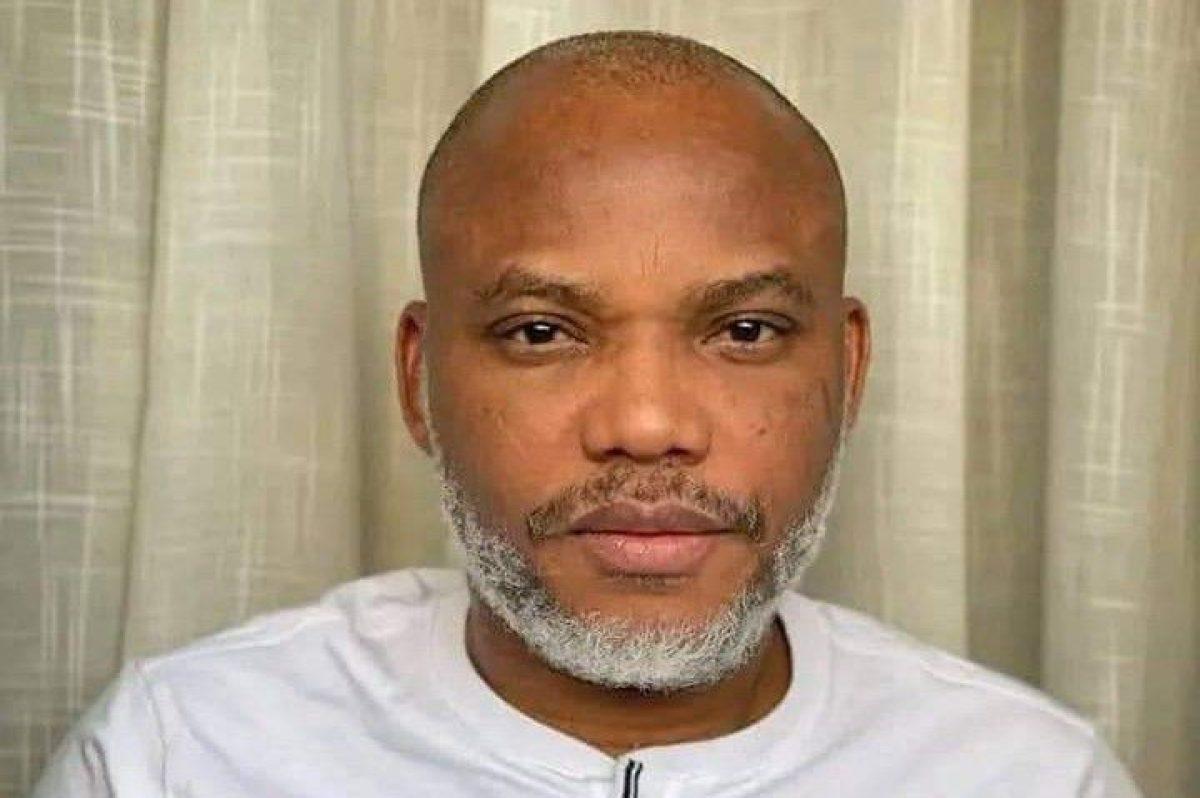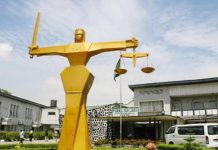Africa-Press – Nigeria. A lawyer, Barrister Njoku Jude Njoku, has said the Supreme Court erred in remitting the terrorism trial of the leader of the Indigenous People of Biafra (IPOB), Nnamdi Kanu, after his acquittal by the Court of Appeal,
Njoku, Consultant to the Mazi Nnamdi Kanu Global Defence Consortium, a group of lawyers fighting for the freedom of the IPOB leader, made the assertion in a statement issued in Abuja,
The statement comes in the wake of Kanu’s refusal to enter his defense after the Nigerian government closed its case against him,
Kanu insists that the prosecution has no case against him, and his defense team argues that his earlier acquittal by the Court of Appeal on October 13, 2022, had nullified his trial,
In the statement titled “A Devastating Critique: The Nigerian Supreme Court’s Unlawful Remittal of Nnamdi Kanu’s Case, the Inviolability of Section 36(9) Immunity, and the Universal Doctrine of Finality of Appellate Discharge,” Njoku faulted the December 15, 2025, decision of the apex court to remit Kanu’s case back to the Abuja Federal High Court for continuation of the Biafra agitator’s trial,
According to Njoku, the decision violated the doctrine of finality of appellate discharge,
He described the apex court’s action as constitutional perversity, noting that the Nigerian Constitution is superior to the Supreme Court,
“The Supreme Court’s decision of 15 December 2023, purporting to remit a charge already extinguished by the Court of Appeal’s lawful discharge of 13 October 2022, constitutes a blatant constitutional perversity that strikes at the very foundation of the rule of law and offends the universal, inviolable Doctrine of Finality of Appellate Discharge, a bedrock principle of common-law jurisprudence recognised across the globe,
“While it is accepted that ‘the law is what the Supreme Court says it is’ in the interpretive hierarchy, this maxim yields inexorably to the supremacy of the Constitution under Sections 1(1) and 1(3), the Constitution is the supreme law, not the Supreme Court, The non-derogable immunity conferred by Section 36(9) upon a person discharged by a court of competent jurisdiction is self-executing, absolute, and beyond the reach of any judicial organ, including the apex court,
“Once the Court of Appeal pronounced discharge, Mazi Nnamdi Kanu became constitutionally untouchable for the same offences, the prosecution was extinguished at its root, and jurisdiction to retry him permanently lost (FRN v. Ifegwu (2003) 15 NWLR (Pt 842) 113 at 175, Abacha v. Fawehinmi (2000) 6 NWLR (Pt 660) 228),”
According to the lawyer, by remitting a nullified, vitiated charge without reversing the finding of illegal rendition, convicting the defendant, or identifying new facts, the Supreme Court did not interpret the law, it violated it, and in doing so, trampled upon the Doctrine of Finality of Appellate Discharge, a doctrine inviolable in every common-law jurisdiction worldwide,
Citing legal authorities from England, (R v. Pinfold [1843] 5 Man & G 463, R v. Green [1950] 1 All ER 786), Njoku stressed that “once an appellate court quashes a conviction or discharges, the Crown is barred from retrying the same offence,” He also highlighted a similar example from Canada, (R v. Riddle [1980] 1 SCR 257), arguing that appellate acquittal is final and conclusive,
In the same vein, he cited a case decided by an Australian court, (Davern v. Messel (1984) 155 CLR 21), to back the argument that “finality attaches immediately upon appellate discharge, the principle is immutable, an appellate discharge terminates the lis with absolute finality, no superior court may revive it without new evidence or distinct charges,”
Insisting that the October 13, 2022, decision of the Court of Appeal, which acquitted Kanu, had nullified his trial, the statement added,
“In Nigeria, this doctrine is constitutionally enshrined in Section 36(9) and judicially fortified (Dokubo-Asari v. FRN (2007) 12 NWLR (Pt 1048) 320 at 375, appellate discharge ‘ends the matter finally and irrevocably’), The Supreme Court’s remittal is thus not merely erroneous, it is jurisdictionally impossible, a global jurisprudential heresy, This was not judicial discretion, it was judicial overreach masquerading as appellate review,
“The ‘unless set aside by a superior court’ doctrine, properly confined to hierarchical obedience under Section 287, cannot be weaponized to pierce a constitutional immunity that operates outside and above the judicial pyramid, nor can it breach the universal finality of appellate discharge, To hold otherwise is to elevate the Supreme Court above the Constitution it swore to uphold and above the common-law world’s sacred principle of finality, rendering Section 36(9) a mere suggestion and Section 1(3) a dead letter,
“Such perverse remittal is void ab initio, constitutionally inexcusable, and an affront to the immutable principle that no court, not even the Supreme Court, may derogate from a fundamental right in clear terms, for in Nigeria and across the common-law universe, the Constitution reigns supreme, the appellate discharge is final, and Mazi Nnamdi Kanu stands immune,”
Njoku further asserted that the five-member panel that “purportedly remitted Kanu’s case committed a second constitutional abomination” by overturning African Charter jurisprudence already settled by a seven-member full constitutional bench of the Supreme Court, “an act unheard of anywhere in the world,”
“This judicial insubordination to binding constitutional precedent violates the very doctrine of stare decisis et non quieta movere (stand by what is decided), undermines institutional coherence, and collapses the hierarchical integrity of the Court itself, for no smaller bench may lawfully overrule or modify a decision of a larger constitutional panel,
“It is therefore beyond question that the December 15, 2023, remittal judgment is not only void for want of jurisdiction, but also void for judicial insurrection against both the Constitution and the African Charter jurisprudence that forms part of Nigeria’s supreme law under Section 12 and Article 1 of the Charter.”
For More News And Analysis About Nigeria Follow Africa-Press







